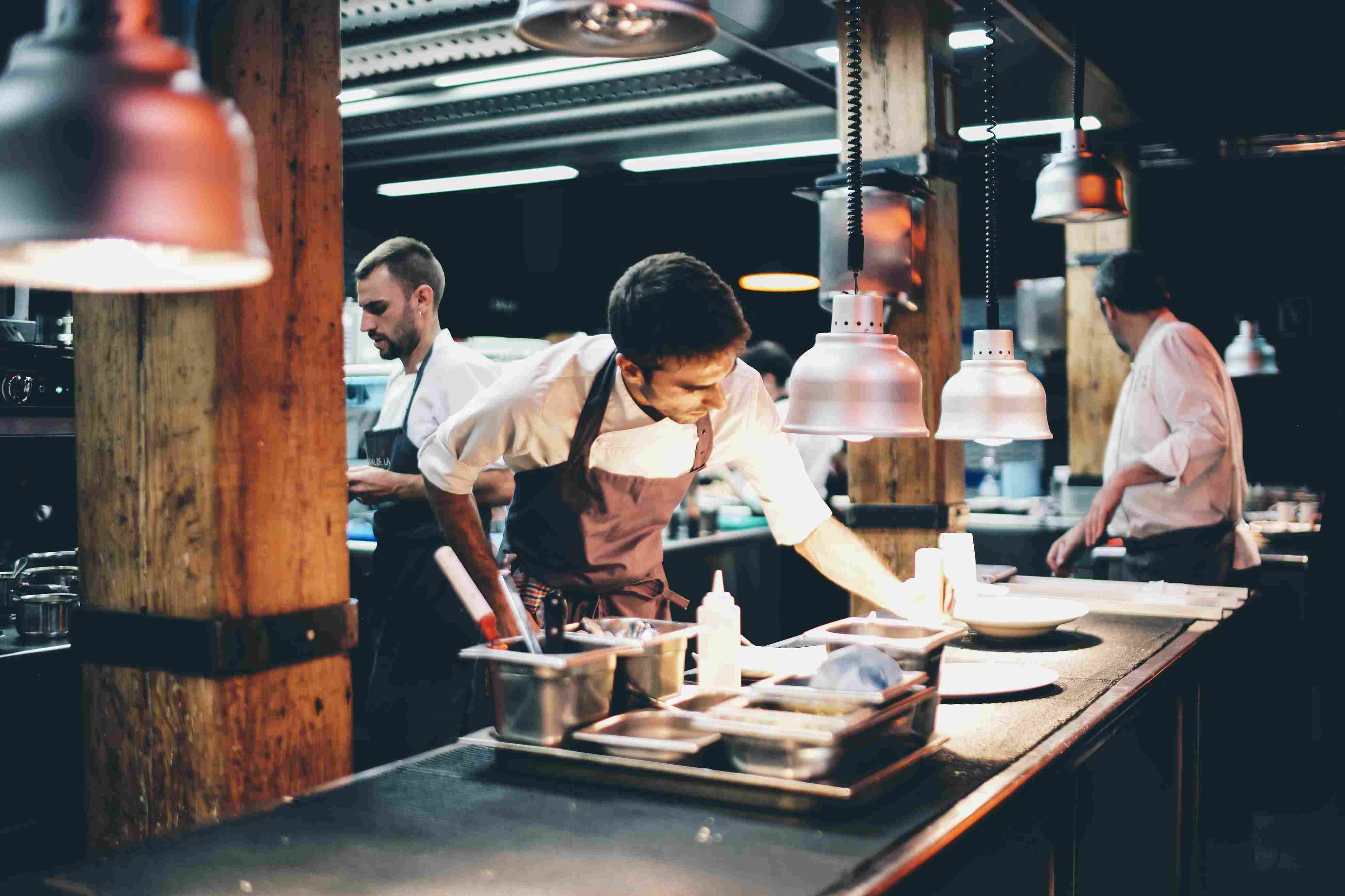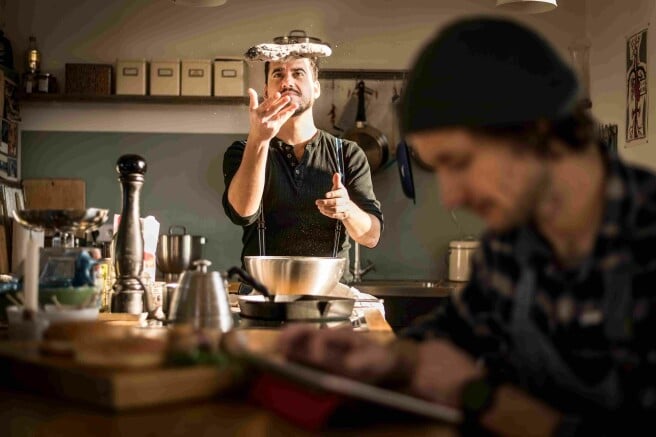Chef vs cook: which is right for me

Outside of the culinary world, the terms ‘chef’ and ‘cook’ are often used interchangeably, but they represent distinct roles with unique responsibilities, skills and career paths. With more than 2.7 million cooks in the USA and 170,000 chefs, this is a popular field to work in.
Whether you're contemplating a career in the kitchen or you’re a seasoned professional seeking to advance your culinary career, deciding which role you want to aim for is essential in charting your course in the culinary industry.
In this article, we look into the differences between these two titles, exploring the characteristics, duties and career trajectories associated with each role to help you decide on your path.
What is a chef?
A chef is the leader of a kitchen, steering the staff with expertise, leadership and creative vision. Beyond mastering the art of cooking, a chef is responsible for orchestrating the entire culinary operation, from menu planning and recipe development to kitchen management and staff supervision.
Chef's role in the kitchen hierarchy
Chefs have high positions in kitchens, overseeing all aspects of food preparation and service. Depending on the size and structure of the kitchen, an experienced chef may hold different titles, such as executive chef, sous chef or chef de cuisine, each with its own set of responsibilities and authority levels.
The executive chef, often called the head chef, holds ultimate responsibility for the kitchen's operations, culinary direction and overall success. Station chefs oversee a certain part of the kitchen, such as meat, desserts or cold food preparation.
Specialties and expertise areas
Chefs often specialize in specific culinary styles, cuisines or techniques, honing their expertise in areas such as French cuisine, pastry arts, molecular gastronomy or sustainable cooking.
Their culinary mastery extends beyond cooking techniques to encompass menu design, flavor pairing, ingredient sourcing and kitchen management, allowing them to create memorable dining experiences that reflect their unique culinary vision and creativity.
What is a cook?
A cook is the backbone of the kitchen, executing culinary tasks with skill, precision and efficiency under the guidance of the chef.
While not holding the same level of authority as a chef, cooks play a vital role in bringing culinary creations to life, contributing to the execution of recipes, food preparation and kitchen operations.
Varieties of cook positions
Within the kitchen brigade, cooks may occupy various positions based on their experience, skills and areas of specialization.
Common cook positions include line cook, prep cook, grill cook and pastry cook, each with its own style, responsibilities and duties.
Line cooks, for example, work on specific stations within the kitchen, such as sauté, grill or fry, while prep cooks focus on preparing ingredients.
General responsibilities
Cooks are in charge of executing recipes, following culinary techniques and maintaining quality standards set by the chef.
Their duties may include food preparation, cooking, plating and cleaning tasks, as well as adhering to food safety and sanitation guidelines.
While cooks may not have the same level of creative input or decision-making authority as chefs, their contribution to the kitchen's smooth operation and culinary excellence is invaluable.
Key distinctions between a chef and a cook
When you’re deciding between which career path to consider, it’s important to look at the key differences. Let’s look at some of the main factors that separate cooks and chefs.
Formal education for chefs
Chefs often go through accredited culinary schools, institutes or apprenticeship programs. These formal culinary education routes provide comprehensive training in cooking techniques, kitchen management and menu development, equipping aspiring chefs with the skills and knowledge needed to excel in the food service industry.
A culinary degree or diploma is typically required for entry-level chef positions in upscale restaurant kitchens, hotels and fine dining establishments.
On-the-job training for cooks
In contrast, cooks may acquire their culinary skills through work experience, starting as kitchen assistants or entry-level cooks and learning under the guidance of seasoned professionals.
While formal education is not always mandatory for cook positions, some cooks may choose to supplement their on-the-job training with culinary courses or workshops to boost their skills and advance their careers.
Responsibilities and daily tasks
Chefs oversee the entire culinary operation, including menu planning, recipe development, kitchen management and staff supervision.
They create menus, invent new dishes and ensure culinary standards are upheld throughout the kitchen. Additionally, chefs may oversee inventory management, budgeting and purchasing to maintain cost efficiency and profitability.
Cooks, on the other hand, focus primarily on executing culinary tasks under the direction of the chef. Their daily tasks may include food preparation, cooking, plating and cleaning duties, as well as following recipes and adhering to food safety protocols.
Different types of cooks work on specific stations in the kitchen, such as sauté, grill or pastry, and collaborate with other kitchen staff to ensure timely and efficient service.
Salary and benefits comparison
Chef positions typically command higher salaries and more comprehensive benefits packages compared to cook positions, with an average annual salary of $51,995.
Those in executive or head chef roles may earn higher salaries, up to $120,000 a year, due to their leadership responsibilities and specialized culinary expertise.
Additionally, chefs often receive benefits such as health insurance, retirement plans, paid time off and employee discounts as part of their compensation package.
Cooks, while essential members of the kitchen team, generally receive lower salaries and fewer benefits compared to chefs, with an average salary of $35,419 a year.
However, cooks may have opportunities for advancement and salary increases as they gain experience and demonstrate proficiency in their roles.
Career path and advancement opportunities
For chefs, the career path often involves moving up through various kitchen positions, from line cook to sous chef to head chef.
Advancement opportunities may come through demonstrating culinary skill, leadership ability and managerial competence, as well as pursuing additional training or certifications in specialized areas of culinary arts.
Cooks may also have opportunities for career advancement by mastering different culinary techniques, gaining experience in various kitchen stations and taking on increased responsibilities in the kitchen.
With dedication, hard work and a commitment to excellence, cooks can rise through the ranks and pursue leadership roles in the culinary industry, but it takes longer without the formal education chefs have.
On top of these opportunities, both cooks and chefs can look at starting an entrepreneurial business. Culinary degrees often include business management to help chefs set up their own restaurants or other food businesses.
Skills essential for success
With the different roles and responsibilities, the skillsets of chefs and cooks will vary as well. However, a lot of these soft skills will help you in any culinary job, so it’s worth trying to learn them all anyway.
Skills every professional chef needs
Much of a chef’s work is about management and overseeing kitchen operations, so many of the skills they need are geared towards that aspect of their role, including:
-
Leadership: effectively manage kitchen staff, delegate tasks and ensure smooth kitchen operations. These skills are essential for overseeing culinary teams, inspiring creativity and building a positive work environment
-
Culinary creativity: chefs must have a keen sense of creativity to innovate and develop new dishes, flavors and presentations. A creative mindset allows chefs to push the boundaries of culinary expression and delight diners with unique and memorable culinary creations
-
Organization and time management: maintain efficiency, meet deadlines and deliver high-quality food consistently. From menu planning and prep work to service execution, chefs must prioritize tasks, manage resources effectively and adapt to changing demands
-
Communication: chefs must be able to communicate clearly, confidently and respectfully with kitchen staff, front-of-house teams, suppliers and customers. Strong communication skills build teamwork and collaboration
Culinary technique: execute recipes with precision, consistency and finesse.
Whether it's knife skills, cooking methods or pastry techniques, chefs must continuously refine their culinary skills through practice, experimentation and lifelong learning

Skills every cook should master
Although many of these skills are also expected of chefs, cooks need to demonstrate:
-
Technical proficiency: a solid foundation of culinary techniques, including knife skills, cooking methods and food safety practices. Technical proficiency allows cooks to execute recipes accurately, produce consistent results and maintain quality standards in the kitchen
-
Adaptability: respond to changing circumstances, such as menu adjustments, last-minute orders or unexpected challenges. Adaptability enables cooks to stay calm under pressure, solve problems effectively and adjust their approach as needed to meet kitchen demands
-
Attention to detail: ensure dishes are prepared and presented to the highest standards of quality and consistency. From ingredient measurements and cooking times to plating techniques and garnishes, cooks must pay close attention to every aspect of food preparation
-
Teamwork: work effectively with kitchen colleagues, communicate efficiently and support each other in achieving common goals. By building a spirit of teamwork and mutual respect, cooks contribute to a positive kitchen culture and improve overall kitchen productivity
-
Time management: prioritize tasks, coordinate with other kitchen staff and meet service deadlines. Effective time management enables cooks to maintain a steady pace of work, minimize delays and ensure food is prepared and served in a timely manner
Conclusion
In the world of culinary arts, the distinction between chefs and cooks extends beyond titles to encompass a rich tapestry of skills, responsibilities and work environments.
While chefs lead with creativity, vision and leadership, cooks excel with technical proficiency, adaptability and teamwork, each contributing to a culinary business in their own way.
If you want to find the right role for you, you should look at what you are most passionate about and find a job title and role that suits you.
Whether aspiring to be a master chef at the helm of a Michelin-starred restaurant or a skilled cook crafting comfort food in a cozy kitchen, the culinary world offers endless opportunities for growth, discovery and fulfillment. If you want to get started on the path to becoming a chef, consider enrolling for a degree at a renowned culinary school such as Ecole Ducasse.


